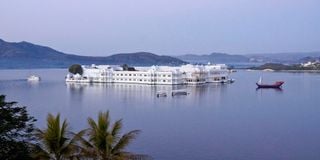Premium
Unsettled in the Lake Palace Hotel

The Lake Palace Hotel on Lake Pichola, Udaipur.
I had never stayed in such a luxurious hotel before. My eyes must have been wide open as I wandered through the lounges and water gardens
It looks like I could be kept in a hospital bed for a couple of weeks, so let me do something I have been wondering about for some time: range over a few of the highlights from over 30 years of consultancy travelling.
My very first consultancy was in India while I was still teaching at Nottingham University. The challenging brief was to make recommendations to the British Council about the most useful things the UK could do in supporting the national literacy scheme that had just been launched in India – the biggest anywhere in the world.
I was both excited and nervous to be travelling across a large swathe of India for the first time and nervous about how effectively I could deal with all the contradictory issues that were going to swirl around my head.
For one stint of my programme I was staying a few nights at the Lake Palace Hotel in Udaipur - the Venice of the East. Formally known as Jag Niwas, it had been a summer palace of the royal dynasty of Mewar. Set on an island in the middle of Lake Pichola, it was constructed of white and black marble and full of rich furniture and hangings.
The place has hosted, during its time as a royal palace or as a luxury hotel, various famous guests including Jacqueline Kennedy, Lord Curzon (who served as Viceroy of India from 1899-1905), Queen Elizabeth and British actor Vivien Leigh. Its most famous time in the limelight, however, occurred in 1983, when it was used in the James Bond film Octopussy. It was also one of the sets for the film version of Paul Scott’s tetralogy about the partition of India, The Raj Quartet. It is now called the ‘Taj Palace Hotel’.
I had never stayed in such a luxurious hotel before. My eyes must have been wide open as I wandered through the lounges and water gardens. Each morning I was steered out on a gondola as far as one of the small fishing villages scattered on the lake shore. There, I would be met by a young Indian community development worker – let’s call him Kabir. We would spend the day together and we would tramp round the village homesteads. In the afternoons, I observed how my young colleague would facilitate a literacy class.
I soon learnt that Kabir had a law degree from the University of Delhi. He had also qualified as a barrister. However, he had given all this up to work alongside poorer members of the lake’s communities, helping them to repair their shelters, improve their fishing methods, find access to basic services for their community and advocate on their behalf.
On one of the evenings, Kabir’s wife invited me to stay at their home for a meal; it was a simple shelter, like many around it. So we drank our cool beers before sunset and I was wondering what would be under the black cloth spread out over an old iron bedstead. When a neighbour’s dog came sniffing around, the black cloth lifted off as one: it was a cloud of black flies – uncovering the thin white potato slices that had been prepared for our evening meal.
That evening, on the gondola back to the Lake Palace, I told the story of my days with Kabir to a grizzled American consultant. I also mentioned my unease about the contrast between the worlds of a consultant and of the poor we were supposed to be helping. ‘Forget about it, son’ he said, laughing. ‘Relax and enjoy the Lake Palace.’
But I could never quite forget. Fortunately.
As for my first consultancy, it was a very short report, arguing that there was nothing of real significance Britain could add to the programme. As Professor A. K. Jalaluddin, the programme’s head, told me: ‘We have had British liberal adult education, American Extension, Danish Folk High Schools – don’t you think it’s time we did something for ourselves?’
John Fox is Chairman of iDC Email: [email protected]





